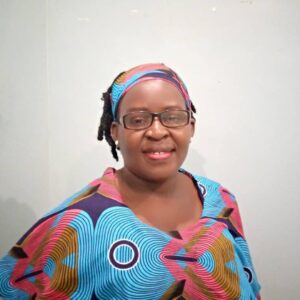Due to multiple intersections of identities, women and girls with disabilities are up to 10 times morel likely than women without disabilities to experience sexual and gender-based violence (SGBV). This discrimination is institutional. As a deaf woman, access to education has been a challenge for me, it’s the same with other critical services such as health, employment, and legal services among others due to communication barriers because of lack of sign language interpreter services across South Sudan. Everywhere I go, I must constantly cater for my interpreter because I know that when I go to meetings, training, or public events it’s never a need put into consideration, even in human rights spaces here in South Sudan. I am privileged to have had access to education so I can read but literacy levels for persons with disabilities are significantly lower than those without disabilities: 85.0% of females and 57.8% of males with a disability cannot read or write.
As the director of South Sudan Women with Disability Network, I continue to witness other women and girls with physical disabilities struggle with mobility, and even when they have things like the wheelchair, general access to buildings is a challenge. It’s the same with visually impaired women and girls who are discriminated against in all aspects. All these challenges in addition to being a woman in a patriarchal society, women and girls with disabilities are more prone to SGBV. The situation is particularly worst for women with intellectual disability. With the communication barriers and all the structural challenges, this means access to information on SGBV, sexual and reproductive health, and rights means there are limited ways of protecting themselves and the kinds of support they get.
In terms of desirability, women with disabilities are considered of “less value” so one wants to be married to a woman with any kind of disability.This is something I have personally experienced. I met a young girl from Bor who was raped by numerous unknown men during the conflict in 2013 and she got infected with STDs and HIV/AIDs in the process. I witnessed how miserable that girl looked as she passed near me because she had a lot of sores on her body, but she had no access to health or legal services. She knew no one would understand her or care even if she opened up about it. When she met me, I was first of all able to communicate with her, I tried to help to connect her with partners to support her.
She was able to get support and was moved to a school for the deaf in Uganda. She was a smart young girl who was very much interested in education. Unfortunately, her health kept deteriorating. She was later returned to Bor where she later passed on. She had no relatives since she lived on the streets with her mother and her mother had a mental health problem. Learning about her death in 2017 was so heartfelt because they just took her back to Bor without even letting us know. We could have stepped in to help her. Many young girls with disabilities are exposed to early pregnancies due to rape, the parents and guardians do not care about them and never take responsibility for their children with disabilities. Most of the women with disability I know are single mothers because the circumstances that lead to their pregnancies are often a result of sexual abuse, not intimacy.
As we commemorate 16 Days of Activism against Gender-Based Violence in South Sudan this year under the theme “take action, be accountable”, let’s approach it in intersectional ways. According to Kimberle Crenshaw “Intersectional feminism centers the voices of those experiencing overlapping, concurrent forms of oppression to understand the depths of the inequalities and the relationships among them in any given context”. Let’s ensure that GBV survivors with disabilities have access to information, can safely report, and timely access health and legal services. That girls with disabilities in South Sudan can go to school and have their needs met in schools and other public places like anyone else. That women with disabilities are included in leadership and decision-making positions to ensure that national laws, policies, and programs include the needs of persons with disabilities especially for women and girls with disabilities who are at the intersections of all forms of SGBV in South Sudan.

